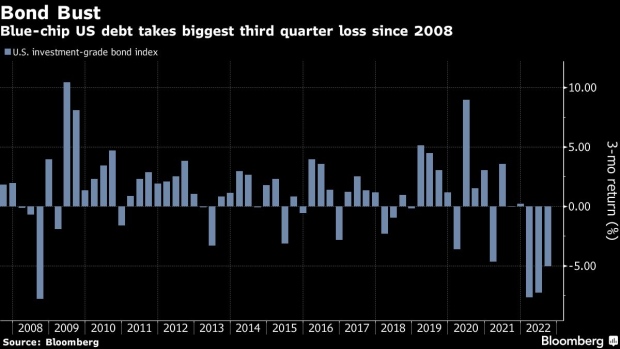Oct 3, 2022
September's Credit Wipeout Foretells Even More Pain in Junk Debt
, Bloomberg News

(Bloomberg) -- The pain is just beginning for investors in US credit markets after Federal Reserve tightening and recession angst sent investment-grade bonds, high-yield debt and leveraged loans spiraling in September.
Losses may pile up further in October for low-grade bonds and loans as debtholders wrestle with an unrelenting Fed, mounting economic risk and market volatility. Debt across the spectrum suffered in September, with high-grade bonds falling 5.26% on a total return basis, the most since April, while a key gauge of US junk debt dropped 3.97% and posted losses for a third consecutive quarter, the longest quarterly losing streak since March 1990. Loans, meanwhile, saw their worst September since 2008.
While spreads are likely nearing a peak for higher-rated US corporate bonds, there’s still plenty of room for lower-rated debt spreads to widen, according to Bloomberg Intelligence’s Noel Hebert. After pressure from this week’s reading of US employment data abates, the director of credit research expects relief to seep into the investment-grade portion of the market.
Junk companies, meantime, are more vulnerable to an economic slowdown because they are highly indebted.
“High yield is a different beast,” said Hebert in email response to questions. “From a spread standpoint, we may be nearer the beginning than the end.”
As 2023 approaches, indebted high-yield issuers that have so far been able to hold off on refinancing as borrowing costs rise may finally be forced to tap markets, Hebert said. He expects to start seeing this occur as companies soon report third-quarter earnings, which could flag shrinking corporate margins.
UBS Group AG strategists led by Matthew Mish said Monday they expect third-quarter earnings to be weak, particularly for highly levered loan issuers. That could lead leveraged loans to underperform junk-rated bonds, they wrote in a note.
“The risk of corporate debt market dysfunction is rising as risk appetite falls and primary market volumes dry up,” they wrote.
As year’s end approaches, credit-market stress, a softer labor market and easing inflationary pressure could ultimately foster a shift in the Fed’s hawkish rhetoric that helps spreads retrace a bit of the widening, they added. Near-term, UBS expects consumer finance and consumer cyclical sectors to underperform in both high-grade and high-yield markets.
Related: Credit Market Moves Toward Break Point as Sales Flop, Funds Flee
Still, not everyone is so downbeat.
“A deep global recession would hurt high yield, but we think the sector is well positioned to withstand the more modest slowdown we anticipate,” Anders Persson, chief investment officer for global fixed income at Nuveen, wrote in a note Friday.
Sales of corporate bonds fell significantly last month, with high-grade bond supply plummeting 47% from the four-year average. Bond funds that buy the debt, meanwhile, suffered their third-largest cash exit. The junk primary market saw the slowest September since 2011.
(Adds UBS analysis starting in seventh paragraph)
©2022 Bloomberg L.P.






